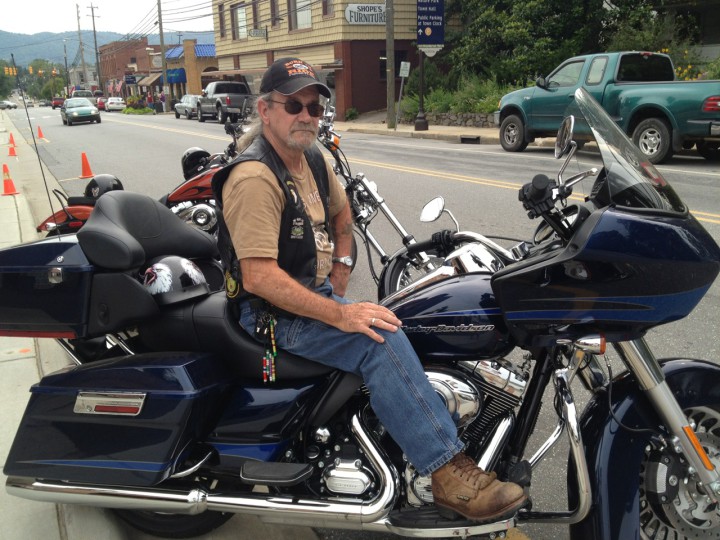“I still don’t celebrate Christmas anymore,” reveals Vietnam veteran Alan Brett. It was 5 a.m. on Christmas Day when he was wounded, and now, the holiday means he gets depressed, uncomfortable and “bitchy.” “I made it hard for my kids, growing up,” says Brett, who’ll be a presenter for an upcoming post-traumatic stress disorder town hall at A-B Tech sponsored by the N.C. chapter of the Vietnam Veterans of America (see box, “Get the Facts”). “We had Christmas, but it wasn’t a pleasant one. After my kids grew up and left, I stopped celebrating Christmas. It’s just easier.”
North Carolina is home to some 775,000 veterans; about 110,000 live in the 23 western counties, including roughly 20,000 in Buncombe County. Veterans, particularly those with PTSD, often face stigma, obstacles to gaining employment, troubled home lives, a propensity for substance abuse and self-imposed isolation to avoid potential triggers. More than 2 in 10 vets with PTSD have a substance abuse disorder, and 1 out of 10 vets returning from Iraq and Afghanistan has such issues, according to the Department of Veterans Affairs.
Like war, PTSD is nothing new, but it’s had as many names as misconceptions. Variously known as “soldier’s heart,” “shell shock,” “combat fatigue” and “delayed stress response syndrome,” it’s been a moving target. The American Psychiatric Association didn’t recognize the diagnosis until 1980, leaving many people stuck wondering what was wrong with them.
There are many reasons veterans avoid getting diagnosed. Social worker Ray Scurfield, who’ll also serve on the panel at the upcoming town hall, runs a private practice treating vets with PTSD. The Vietnam veteran says there are both internal and external obstacles to reaching out for help. “You have vets who deny or minimize PTSD issues because they don’t see themselves as disabled, or they don’t want to admit to themselves how much they might have been negatively impacted by their military experiences,” Scurfield explains. In addition, he continues, “For a number of vets, the process feels very dehumanizing. They feel like they’re being discounted — like they’re almost on trial.”
Brandon Wilson, deputy director of the North Carolina Division of Veterans Affairs, says another huge barrier is the military culture itself. “They teach you that you don’t have a problem: You’re on the front line, so you need to toughen up, suck it up and move forward. Most military personnel, particularly your combat veterans, have that instilled in them.”
Vietnam veteran Allan Perkal, who organized the PTSD town hall on behalf of the N.C. State Council of the Vietnam Veterans of America, says societal attitudes also create barriers. For some people, he notes, “Psychiatric labels have an unhealthy connotation.” Others distrust “psychotherapies and the systems providing the therapies. It’s just a fear of the unknown, the fear of actually opening up those experiences and talking about what might happen.” For those and other reasons, Perkal continues, “Most people try to cope with it either by avoiding the issues, putting it on the shelf, self-medicating or just moving on like it doesn’t exist. But as we’ve learned from the past, these memories don’t go away, and they have an impact on the individual’s and the family unit’s quality of life.”
In the ’70s, adds Brett, it was hard enough just being a Vietnam vet without tacking on the stigma of a mental health label. “People stopped putting that they were in Vietnam on job applications. They just said they were in the military. And back in the day, everyone was afraid that if you got a diagnosis you were crazy. So they avoided that.”
PTSD colors everything
But as Brett can testify, unchecked PTSD can creep into all aspects of your life. “I kept my family sort of isolated and pushed away. Having someone close to me felt dangerous, and eventually they got the hint and left,” he says.
Work was no picnic, either. “I had trouble dealing with what little work I did have,” he recalls. “I had trouble with supervisors that were younger, and if they gave me an order that I perceived as being dangerous, I just wouldn’t do it. I was probably drinking a little too much at the time.”
For Carroll “Spider” Trantham, getting sober was a wake-up call. “During my recovery from alcoholism, it finally dawned on me that I had some sort of PTSD, because I was always angry for no real reason,” remembers Trantham, who’s the president of the Asheville-based Vietnam Veterans of America Chapter 124. He recommends talking with people who’ve had similar experiences. “If you can get with a veterans group, you can unleash some of the pent-up aggravations and see how other people have dealt with PTSD,” he points out.
Western North Carolina says Perkal, is a good place for veterans seeking help with PTSD, in terms of available resources, a strong veteran community and a receptive VA Hospital. But it’s also a great place for people to hide from their problems. “I think the nature of the mountains provides isolation and anonymity for the individual,” he points out, “and they live in areas that aren’t as accessible to the institutions providing care, whether it’s community-based or the VA. So the veterans are out there, and we’re trying to reach those who haven’t been reached and are fearful of those institutions.”
Wilson, an Iraqi Freedom veteran, says finding common ground can make all the difference. “I’m sleeved: I’ve got tattoos on my arms. So if I know I’m meeting a veteran like that, I’m not going to wear my suit and tie; I’m gonna take my jacket off and roll my sleeves up because, automatically, it’s a culture thing. They see a tattoo on my arm, they’re all tatted up, and there’s a trust factor. With that trust there, I’ve got a better opportunity to reach and communicate with them.”
Financial incentives can also help launch someone on a healing path. “I’m getting them the care that they need,” he explains. “They may be going just for the money, but all of a sudden, the therapists and groups can open their eyes. Now they’re getting the care that they deserve and need without them really realizing it’s happening. Then all of a sudden they say, ‘Hey, this is good: I’m healthier, my family life is healthier, my wife’s happy with me, and I’m playing with my kids because of this.’”

Not everyone finds help through traditional avenues. Substance abuse often leads to trouble with the law, and sometimes, that can be a good thing. Sentencing options, notes Perkal, can give vets an incentive to start treatment. “The system says, ‘You’ve got to take responsibility, but we’ve got this program.’ In lieu of incarceration, a vet can have the option, depending on the crime, of entering a program. That could be their first foray into treatment.”
Letting go
But while it’s good to get help with PTSD, there are valid reasons for some veterans’ hesitance and fear. “The problem is,” notes Scurfield, “they’re holding on so tightly because they’re afraid if they start crying, they won’t be able to stop. If they remember too much, they won’t be able to get it out of their head. Most vets with PTSD are trying not to be around things that remind them of their issues, so they tend to stay away from people. There’s a sense that isolation protects them — and others, if they’re in that small group that has impulse-control issues.”
Nonetheless, finding a safe environment can be tremendously beneficial, and being around other veterans can help build trust. “We started talking about things, and it started to make sense,” remembers Brett. “I really didn’t know why I was that angry at something. I found a therapist that was actually a veteran, and I was able to start to talk some things out. I could see where my anger was coming from, and the more I understood why things were the way they were, the easier it was to manage.”
Managing PTSD is the key to not letting it sabotage people’s lives. But it takes understanding on the part of employers and the community at large.
Brenda Ploss of the NCWorks Career Center in Asheville, helps veterans build résumés and hone interview skills to overcome employment barriers. She also connects them with PTSD specialists. A combat veteran herself, Ploss understands her clients’ struggles. “Sometimes the biggest thing I see is trying to avoid certain situations,” she explains. “But that may go against what a veteran’s skills are, which puts them at a disadvantage in looking for work. They tend to avoid going back into something they may love to do, because it has too many triggers for them.”
Those triggers can also lead to misunderstandings in the workplace. Some people, notes Ploss, associate PTSD with violence, but in most cases, it simply means “They may have slight memory loss, and that’s why they need to have things written down. They may have lack of concentration; they may already have some coping mechanisms.” For these reasons, employers may need to make special arrangements for some PTSD workers. “Sometimes they need a place to go and be quiet. The main thing,” she stresses, “is education. Veterans have a wealth of information to offer and soft skills, and with some reasonable accommodation they can be your most effective and best employee ever.”
Still, that fear of the unknown is hard to overcome. Some employers, says Perkal, may think the person they’re hiring “is a trained killer — and what will happen when this individual is on our worksite and loses it?”
But in fact, says Scurfield, “If they’re a threat to anyone, it tends to be toward themselves.”
Admittedly, there are extreme cases that render a particular veteran unsuited for jobs involving certain types of triggers. Scurfield cites the case of a bomb scare involving a huge container of gasoline that it was feared had been rigged with explosives. In the end, it turned out that there was no bomb, but the damage had been done. A veteran working there as a heavy equipment operator, says Scurfield, had to lift the container while the bomb squad investigated, and he “ended up having a phobia about any kind of container that might have something explosive in it. He did everything he could to avoid being around trains, container cars, 18-wheelers on the highway, storage facilities that contained gas. Anytime a large vehicle like that was in the vicinity, he would take evasive action and turn onto a side street to get away from it.”
Ken Ray of NCWorks focuses on finding and educating employers who are willing to hire veterans with PTSD. Overall, he says, Western North Carolina’s business community has “a lot of sympathy toward veterans, especially with PTSD. They keep up with what’s been going on since 9/11, and they understand that we’ve got a lot of folks coming back that have been in some pretty strenuous situations.” PTSD, he notes, is not a one-size-fits-all disorder, and not everyone needs the same level of accommodation. “Sometimes it might be a situation where an employee can’t work well in large groups or around others. In some cases, employers set up a location where the employee can not be surrounded by a lot of noise and people.” Ray says he works with a variety of businesses, including manufacturing, retail, restaurants and others. “If it’s an industry in this area, there’s a good chance they’ve heard from me.”

Ploss adds that it goes beyond just getting a job, “One of our focuses is finding gainful employment, not just finding employment. … I want to find what they really want to do in life and how we can get them there. It may be baby steps, but we may be able to get them there faster than they thought originally.”
The next wave
Having watched society’s attitudes toward veterans and PTSD gradually evolve, many Vietnam veterans have a strong desire to help those coming home from today’s conflicts find acceptance and the resources they need. And despite the generation gap and differences in the various wars, says Trantham, “The young men and women are the same identical people we were 40 years ago. They think, ‘We don’t need any stinking help — just leave me alone’ when, in fact, they do need help. What we would love to do is get the information out. And maybe we can keep one veteran from committing suicide, keep one marriage from going down the tubes or keep one vet from starting a drinking problem.”
The military culture, too, is becoming more proactive, says Brett. Newer veterans “start talking about PTSD in the military, so it’s not as bad as it used to be, where you couldn’t talk about anything. They get out and they’re automatically connected with the VA, go through a screening and can come out with a PTSD diagnosis. That never happened before.”
At the state level, notes Wilson, Gov. Pat McCrory created a cabinet-level Department of Military and Veterans Affairs. “So now, in the governor’s weekly cabinet meetings, we have a representative there. That’s a large step.”
Beyond that, however, “Community awareness is key. There needs to be more education so communities can say, ‘Hey, people with PTSD aren’t crazy. They’re suffering from a disability incurred by protecting our freedoms, and we need to help and embrace them.”
To that end, the upcoming town hall will provide information about the various community, state and federal resources available for PTSD and related issues. Perkal says he hopes the event will reach vets who’ve avoided dealing with their issues for too long. “There are people from the Vietnam generation that are still struggling: In a sense, they haven’t come back from the war zone. Part of them died in the war zone, and the part that came back hasn’t been successful.”
Trantham, too, wants younger veterans to know about the resources available and realize that the older generation knows what they’re going through. Nonetheless, he continues, “You don’t save all of them, by any means. They’re just as hardheaded as we were. But if we can get one or two, they in turn can tell other vets of their age, ‘Hey, I got help from the VA.’”



Before you comment
The comments section is here to provide a platform for civil dialogue on the issues we face together as a local community. Xpress is committed to offering this platform for all voices, but when the tone of the discussion gets nasty or strays off topic, we believe many people choose not to participate. Xpress editors are determined to moderate comments to ensure a constructive interchange is maintained. All comments judged not to be in keeping with the spirit of civil discourse will be removed and repeat violators will be banned. See here for our terms of service. Thank you for being part of this effort to promote respectful discussion.